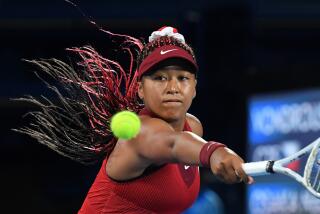Williamses Learn in Double Time
- Share via
One of the (many) touching moments of the 1999 U.S. Open final was Zina Garrison’s tearful and joyous reaction to Serena Williams’ first Grand Slam singles title. Garrison impulsively hopped on a plane that morning, flying from Houston to New York, knowing she couldn’t forgive herself if she missed the historic moment.
More recently, she was on hand for another significant Williams moment as an assistant to Olympic coach Billie Jean King in Sydney.
An exhausted Venus Williams fought through tough three-setters against Arantxa Sanchez-Vicario of Spain and Monica Seles, then defeated Elena Dementieva of Russia to win the gold medal. Venus and Serena demolished the competition to win the doubles, and Serena demolished the opposition to win the unofficial pin-trading title.
Garrison has been an interested observer of the Williamses’ progress. She has watched the sisters from afar and has had the chance to work with Venus and Serena last year in Fed Cup competition as King’s assistant. Dating to the early ‘90s, when Garrison first met Venus and Serena, she has always been impressed by their ability to quickly pick up nuances of the game.
It happened again in Sydney.
Garrison and King worked with them on their doubles games, and Garrison said the improvement they made in a matter of days was “amazing.” The sisters needed three sets in their opening doubles match at the Olympics and had little trouble afterward, winning the final against Miriam Oremans and Kristie Boogert of the Netherlands, 6-1, 6-1.
“What I can basically tell you is that they won a couple of Grand Slam doubles tournaments and were playing singles,” Garrison said. “They had no idea what doubles was about. It was interesting. Billie and I got in there and told them a couple of things, and they were like, ‘Oh really?’
“It was almost like working with a beginner because in doubles they had no clue. They still won it. The great thing about both of them is that they learn really quickly and they were willing to learn.”
Venus obviously knows a lot already. The depth in women’s tennis makes her 35-match win streak--which ended against Lindsay Davenport on Sunday in Linz, Austria--that much more impressive.
That sort of winning streak is easily within reach for Team Williams in doubles. The sisters’ last loss came at the U.S. Open, but only by default, because Serena was injured. The default does not count as a loss on the official won-loss record, giving the Williamses a 22-match win streak.
Davenport and Corina Morariu were the last team to defeat them on the court, in the 1999 final at Carlsbad. Still, it may take a long time for the sisters to hit the 40-something win mark simply because they rarely enter the same event, outside of the Grand Slams.
“Tennis has so much depth,” Garrison said. “It can change all the time. Lindsay’s a great doubles player. Monica [Seles] has started to play more.”
Still, as difficult as it is to beat Venus, it is even tougher to defeat the two in doubles, as the sisters have noted.
ALARM CLOCK?
Garrison was talking about the Fed Cup event involving the United States, Spain, Belgium and the Czech Republic, Nov. 21-25, in Las Vegas. She mentioned that Davenport will represent the United States, which led to talk about the strength of women’s tennis, which led to the topic of equal prize money.
The Australian Open recently took the major step of making the women’s prize money equal to the men’s, the second Grand Slam event to do so. The remaining laggards, of course, are Wimbledon and the French Open.
What will it take for those outsiders to adopt the same policy?
“To wake up,” Garrison said.
“We’ve been talking this talk for so long, and it’s nice to see the Australian Open change their ways a little bit, a lot actually. Unfortunately, I hate to say it, it’s still a man’s world. It’s still kind of tough. In just the last five years, people have accepted that women athletes can be entertaining. People want to see us play.”
PASSING OF PIONEER
The happiest tennis parent at the Davis Cup match between the United States and Zimbabwe this year at Harare had to be Don Black. After all, Black was essentially responsible for Zimbabwe’s team--his sons, Wayne and Byron, played singles and often doubles in Davis Cup, although they did not pair together against the Americans.
For the U.S. match, Black, who played at Wimbledon in the ‘50s, was a proud host, spending an afternoon showing reporters the training grounds for his children. All three--Wayne, Byron and daughter Cara--are touring pros, and Black told of getting the kids up at 5 a.m. to practice. He called it “the contract.”
There were grass courts surrounded by avocado and banana trees at the family home and a barefooted Black was busy giving lessons to local children that February day.
Some eight months later, on Thursday, the man Zimbabwe officials credited with putting the country on the world stage died of colon cancer at age 72. Black had been admitted to a Harare hospital earlier in the week.
AND, FINALLY
Remember Pete Sampras and Andre Agassi? They are scheduled to return to the tour at the Stuttgart, Germany, stop, which starts Oct. 30. It will be their first tournament since the U.S. Open.
Agassi beat youngster Andy Roddick in a charity exhibition at Texas last week. Gustavo Kuerten, Sampras and Marat Safin are separated by only 12 points in the ATP Champions Race. Kuerten and Safin are scheduled to play at Stuttgart. Safin also is an early entry for next year’s tournament at UCLA, July 23-29.
More to Read
Go beyond the scoreboard
Get the latest on L.A.'s teams in the daily Sports Report newsletter.
You may occasionally receive promotional content from the Los Angeles Times.







